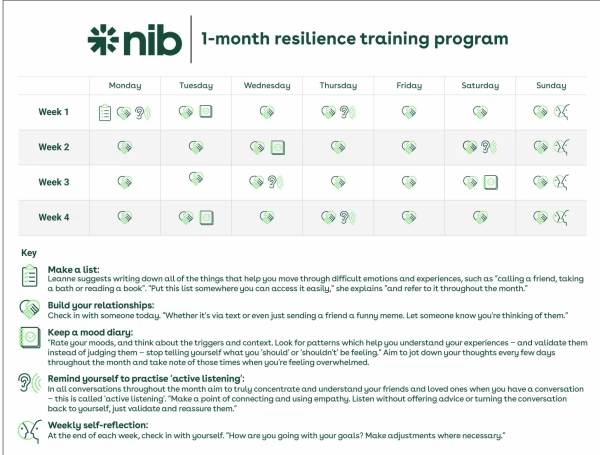1 month to mental strength: What is resilience and how do I build it?
Building resilience is vital for good mental health


Life will always come with challenges, whether it’s related to family, health, friendships or work – and we all deal with these challenges in our own way. The quality that helps us deal with life’s ups and downs is called resilience, and it’s a major part of mental wellbeing.
Experts say building resilience can enhance our relationships, help us navigate life changes, approach new situations with confidence and improve our mental health.
So what exactly is resilience and how can we build it? We spoke to Leanne Hall, a psychologist and therapist with more than two decades of experience under her belt, to find out.
What is resilience?
Resilience is the inner strength that helps you bounce back from setbacks such as illness, break-ups and job loss, rather than becoming overwhelmed or turning to unhealthy coping mechanisms. Instead of trying to prevent negative or stressful events, building resilience helps reduce the level of disruption and length of time these challenges have on your life.
The good news is that resilience isn’t something you’re either born with or not – you can develop resilience throughout your life.
Leanne explains that building resilience is vital for good mental health.
“Resilience is a key factor in preventing more serious mental health issues, as well as an important part of recovery,” she says.
“Resilience can also help protect us against developing mental health problems such as anxiety and depression, and can offset risk factors such as bullying or family history. This means that someone who has resilient characteristics is more likely to cope better with adversity.”

7 ways to build mental toughness and resilience
1. Build your self-esteem
Leanne says that building resilience often goes hand in hand with self-efficacy – your belief in yourself. So it’s vital that you avoid negative self-talk and practise positive self-talk regularly to help boost resilience.
2. Strengthen relationships
Knowing you have a strong support network in good times and bad is an important aspect of resilience. “Work on your communication – and invest in important relationships,” advises Leanne.
3. Set realistic and measurable goals
“A sense of achievement is important and a key factor in building self-efficacy,” she says, adding: “Unrealistic goals end up making you feel like a failure.”
4. Develop good boundaries
“Learn to say ‘no’, and recognise that your needs are just as important as everyone else’s.”
5. Learn from experience
Reflect on how you’ve coped with setbacks in the past in order to identify positive and negative behaviour patterns.
6. Have a positive mindset
Practising mindfulness can help you deal with negative thoughts and emotions when they arise, and cope better with difficulties. “Know that all emotions are valid – and it’s completely normal to feel overwhelmed, upset, anxious or angry sometimes,” Leanne says.
7. Be proactive about dealing with problems
Instead of ignoring problems, figure out what needs to be done and take action – and if you need support, ask for it. “Reaching out and asking for help is a sign of resilience, not a sign of weakness,” says Leanne.
Related: Mental health vs mental illness
One-month resilience training program
Ready to strengthen your resilience? Leanne has put together a training program to help us apply resilience strategies into our lives.

National helplines
If you have an urgent need for help with your mental health, contact one of the helplines below.
Lifeline (24 hours): 13 11 14
Kids Helpline (24 hours): 1800 55 1800
MensLine Australia (24 hours): 1300 78 99 78
SANE Helpline (mental illness information, support and referral): 1800 18 7263
Why is prevention better than cure?
When it comes to our health, prevention is better than cure
The benefits of quitting coffee
Could giving coffee a miss be the key to better health?
Alcohol and wellbeing self-assessment tool aims to combat risky drinking behaviours
Hello Sunday Morning's app supports Shea's personal journey
Leanne Hall
Leanne Hall is an integrative psychologist with additional qualifications in health and fitness and an impressive career as a therapist and health coach spanning more than 20 years. She’s the author of Head First Health Fast, The Smart Approach To Outwitting Body Issues and Sustaining Achievable Health and is currently completing her PhD in Ultra Running. Leanne is passionate about debunking the myth of 'balance' and keeps it real in everything she does. Something not many people know is that Leanne can mimic bird noises very well...




